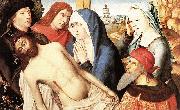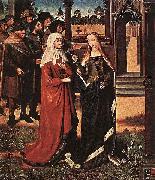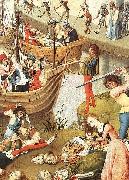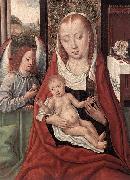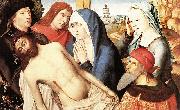Master of the Legend of St. Lucy Olja Måleriet ReproduceringAll Master of the Legend of St. Lucy Oil Paintings(fl. 1480-1510) was an unidentified Early Netherlandish painter who worked in Bruges, now a city in Belgium. His name comes from for an altarpiece in the church of Saint James in Bruges, which is dated 1480 and depicts three scenes from the life of Saint Lucy. Since then, twenty-five to thirty-five paintings have been attributed to the same hand. He may have trained Spanish students at his studio in Bruges. Many of them are characterized by views of the city of Bruges in the background, and can be dated according to the level of construction of its belfry. He may have trained with Dieric Bouts, and was certainly influenced by Bruges' greatest artist at the time, Hans Memling. |
|||

|
|||
|
|
|||
|
||||||||
| Master of the Legend of St. Lucy (fl. 1480-1510) was an unidentified Early Netherlandish painter who worked in Bruges, now a city in Belgium. His name comes from for an altarpiece in the church of Saint James in Bruges, which is dated 1480 and depicts three scenes from the life of Saint Lucy. Since then, twenty-five to thirty-five paintings have been attributed to the same hand. He may have trained Spanish students at his studio in Bruges. Many of them are characterized by views of the city of Bruges in the background, and can be dated according to the level of construction of its belfry. He may have trained with Dieric Bouts, and was certainly influenced by Bruges' greatest artist at the time, Hans Memling. |
||||||||
|
|
||||||||
| Måleriet Identifieringen :: 85899 Lamentation Date 1490s Medium Oil on oak panel Dimensions Height: 81.2 cm (32 in). Width: 123.3 cm (48.5 in). cjr |
||||||||
|
|
||||||||
| Måleriet Identifieringen :: 86205 Scene from the St Lucy Legend Date 1480(1480) Medium Oil on wood cjr |
||||||||
|
|
||||||||
| Måleriet Identifieringen :: 87835 Scenes from the Life of St Ursula second half of 15th century Medium Oil on wood cyf |
||||||||
|
|
||||||||
| Måleriet Identifieringen :: 90006 Virgin and Child with an Angel between 1480(1480) and 1500(1500) Medium oil on oak panel cyf |
||||||||
|
|
||||||||
| Måleriet Identifieringen :: 90050 Lamentation 1490s Medium oil on oak panel Dimensions Height: 81.2 cm (32 in). Width: 123.3 cm (48.5 in). cyf |
||||||||
|
|
||||||||
| FÖREGÅENDE KONSTNÄR Nästa Konstnär | ||||||||
|
|
||||||||
|
Master of the Legend of St. Lucy (fl. 1480-1510) was an unidentified Early Netherlandish painter who worked in Bruges, now a city in Belgium. His name comes from for an altarpiece in the church of Saint James in Bruges, which is dated 1480 and depicts three scenes from the life of Saint Lucy. Since then, twenty-five to thirty-five paintings have been attributed to the same hand. He may have trained Spanish students at his studio in Bruges. Many of them are characterized by views of the city of Bruges in the background, and can be dated according to the level of construction of its belfry. He may have trained with Dieric Bouts, and was certainly influenced by Bruges' greatest artist at the time, Hans Memling. |
||||||||
|
|
||||||||
|
KOMMA I KONTAKT MED Oss |





